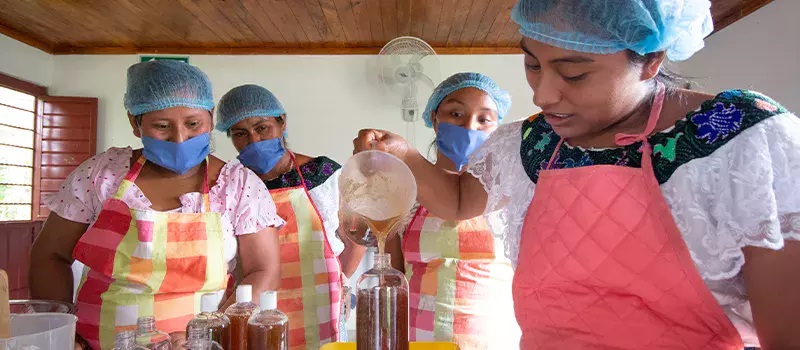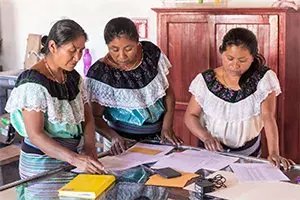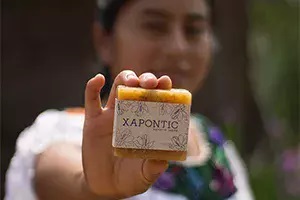Social and Solidarity Economy: the Tzeltal women of Xapontic

Through investments, Xapontic has added shampoo to its product line.
Conceivably so, bridges of relationship that stretch us to be people of encounter are being built out of soap.
It is handcrafted by Xapontic, a producer of artisanal personal care products, owned and operated by a team of Tzeltal women in Chiapas, Mexico. A Tzeltal word meaning “our soap” in English, Xapontic products are made with natural, regional ingredients, including honey and organic coffee — a tradition passed down from generation to generation, “made in harmony with Mother Earth … to embrace your heart.”
Xapontic is visioned “… to represent a bridge to one of the indigenous cultures of Mexico and the empowerment of women, organized in collective work to build a fairer, more dignified and inclusive economic alternative.” It is a model for social and solidarity economics that exemplifies Franciscan remuneration and the process of responsible investing. And it is supported in part by an impact investment made collaboratively by FSPA in celebration of Catholic faith and values, to benefit people and planet alike.
Created in 2011, the business is part of Yomol A’tel, a nonprofit parent company that provides sustainability and scalability for five cooperatives producing natural products by more than 360 Tzeltal families in the region, including Xapontic. It is envisioned “to be a movement of people, families, communities and companies of the social and solidarity economy that … are a sustainable alternative to the current economic and business logistic, generating social inclusion, autonomy, dignity and lequil cuxlejalil [“good living,” in English] to maintain a balance between work, social life and nature.”
Eduardo Hernández, Yomol A’tel Commercial Coordinator, shares that Xapontic was born by “wives of Yomol A’tel producers who also wanted to take part in decision-making processes to improve income for their families.” These women have historically been typecast in the stereotypical gender roles of cooking and raising children. And, “with a lack of programs, mostly in the south of Mexico,” says Eduardo, “women don’t receive higher education.” These barriers are often portrayed as a lack of personal capacity for business administration, organization and accounting. Yet “with training in everything from bill of sale to the chemical formulas of soap,” 45 women stepped forward to form Xapontic and proved the old wives’ tale wrong. Says Eduardo, “the fear of participation has been overcome.”


Left: From development and production to business administration, Xapontic members take on all tasks.
Right: Xapontic soaps are made with local and natural ingredients "in harmony with Mother Earth.”
As Xapontic flourished, growing pains — those that every corporation most certainly comes into — were felt. “Xapontic members made the decision to create the first board of directors in 2018. Manuela Rodríguez, the sales director of Xapontic, knew how important it was to provide financial and social-economic information to the investment organizations who support Xapontic,” says Eduardo. Xapontic members also discovered that “establishing an entity that could legally support their work” was essential. With that came the creation of JunPajal O'tanil, which implements cooperative principals for Yomol A’tel businesses, including Xapontic, and provides legal brand certification. This qualification has opened the door for product diversification and the addition of shampoo, cream and textiles based in local embroidery to Xapontic’s offerings.
With investments and growth, challenges like organization, communication and transportation between Xapontic headquarters and the producing communities located throughout the Chilón municipality of Chiapas were overcome. “Thanks to donations and investments, Xapontic has also celebrated an important milestone — the construction of three laboratories in the soap-producing regions,” shares Eduardo.
So the view of Yomol A’tel and Xapontic continues to broaden, the movement of people, families, communities and companies keeps gaining momentum. “I hope that Xapontic can always convey the message of why it builds a product based on the production and consumption model of social and solidarity economy,” says Eduardo. “In this way, the producing members find a greater sense in promoting and growing their cooperative, and the clients spread the message that alternative consumption is real and possible.”
And, most importantly, social inclusion, autonomy, dignity and lequil cuxlejalil — good living — will be the way of life for to people in the Tzeltal community for generations to come.
Two of Xapontic’s purveyors are sharing their goals for business advancement.
“I would like the JunPajal O’tanil member group to grow with more female producers. As we grow, we need the commercialization team to grow, too,” says Maria Morales. And Alba Morales envisions expansion for Xapontic’s product line. “I would like to see how increasing crops through developing more aromatic plants in the fields and producing more products, like essential oils would consequently improve our income.”
